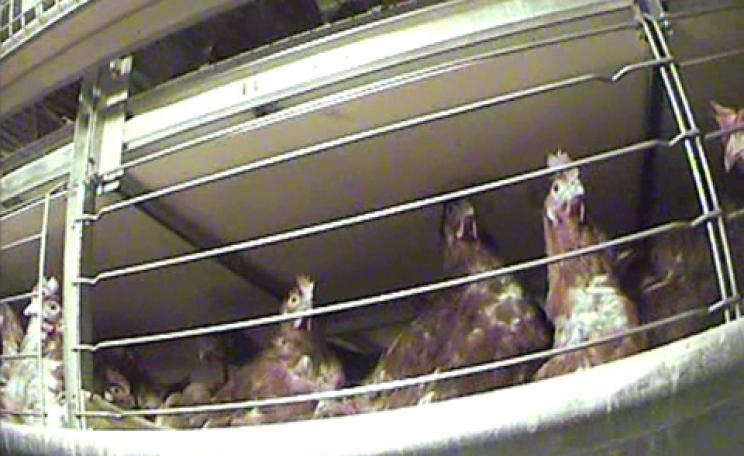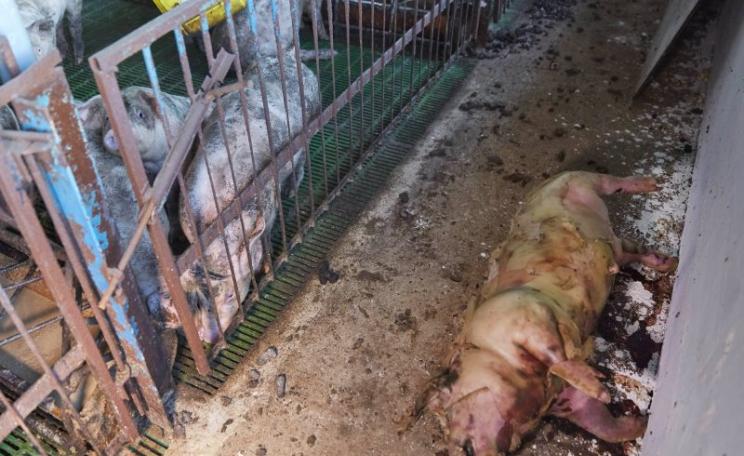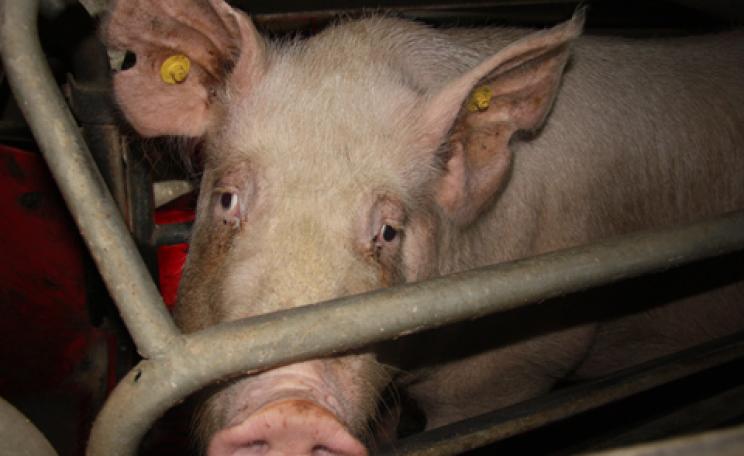Pig Business charts the rise of Smithfield Foods, now the world’s biggest pork producer, and its expansion into Poland and Romania where it dominates the industry, taking advantage of low capital costs, cheap labour and unenforced regulations. Both countries, expecting employment and the benefits of inward investment have woken up too late to the aggressive and predatory nature of a business whose profits go to global investors while stench, pollution, disease and bankruptcies are the costs paid by local communities.
In the film, the author and environmental lawyer Robert Kennedy Jnr explains that these are ‘externalised’ costs are borne all of us. “Smithfield Foods cannot produce a pork chop more cheaply than a family farmer without breaking the law”, he says.
In the UK, welfare laws are among the highest in Europe, and yet meat is imported from farms in Europe which use methods that are illegal in the UK. The result is that British farmers cannot compete and fifty percent of the UK pig herd has been lost in the past 12 years, farmers have lost their livelihoods and communities have broken up. If public bodies such as schools, prisons and hospitals had supported UK farmers, as the French government supports theirs, by sourcing outdoor or high welfare pork from British farms, those farmers might still be on their land.
The UK NGO Compassion in World Farming surveyed factory farms in 5 EU countries and found between 70 per cent and 100 per cent of farms they visited were failing to obey the EU Pig Welfare Directive which requires that pigs are given straw or similar material, and are not routinely tail docked. In January 2013 the long awaited EU ban on sow stalls is due to begin, although it is not a complete ban – factory farms will still be allowed to abuse the pregnant sows by confining them in narrow metal cages known as ‘sow stalls’ for around two months a year, and will also be allowed to keep them in farrowing crates in which they cannot turn around for a further two months a year.
Across the EU there is no information on package labels that tells consumers whether pork was raised on a factory farm, in spite of a 2005 survey that found that 74 per cent believe they can improve animal welfare by their purchasing decisions. Consumers who have become aware of the cruelty that animals endure in factory farms are asking for method of production labelling which would allow them to avoid low welfare products.
However the UK government has only come up with voluntary code for country of origin labelling, which, when it is complied with, at least tells consumers if the pigs have been raised in the UK which has banned sow stalls. However, the UK still allows sows to be kept in farrowing crates for five weeks each time she has piglets, so consumers who want to avoid factory farms must buy pork with Outdoor Reared, Outdoor Bred, Free Range or Organic labels.
Routine antibiotic use
The factory farm system relies on the routine use of antibiotics to prevent disease spreading quickly through the contagious, overcrowded barns. To accelerate growth, piglets are weaned early, at about four weeks, before their immune system has had a chance to develop, and without antibiotics many would die. Approximately 50 per cent of all antibiotics used in the UK and 64 per cent of all antibiotics used on farms are given to pigs. All but one of these are the same as, or closely related to, medically important antibiotics used in human medicine and are becoming ineffective as more and more disease-causing bacteria become resistant to them.
A report recently published in the USA confirms that MRSA and other antibiotic resistant bacteria can be spread from animals to humans by flies and cockroaches. The research showed that strains found in the intestines of pigs were the same as were found on flies which fly several kilometres and can spread the bacteria each time they land on food. The Soil Association said this new research confirmed their concerns that the overuse of antibiotics in factory farms puts the health of neighbouring communities at risk.
In April 2011 a Danish farmer Borup Pedersen who raises an indoor, intensive herd of pigs, replaced the GM soya he had been feeding his pigs for many years, with non-GM soya. Within two days diahorrea which had been causing the death of up to 30 per cent of his piglets suddenly cleared up; the piglets became sturdier and more evenly sized. Sow deaths from bloat and ulcers which had been killing 18 sows a year, stopped completely, and during the year following the conversion to non-GM feed his use of antibiotics dropped by half. The savings in Mr Pedersen’s vet and medicine bills far outweigh the extra cost of buying non-GM feed.
Mr Pedersen believes that the high rate of dead and deformed piglets on farms using GM soy is caused by residues of glyphosate in the feed. The soy is genetically modified not to resist drought or increase yields, but to be immune to the glyphosate based herbicide Roundup, which is sprayed several times on the soy crop to kill weeds. Reports which Mr Pedersen has read indicate that the glyphosate residues change the microflora and allow Clostridia bacteria to grow in the animals’ gut causing fatal bloat and diahorrea.
Now weeds are becoming resistant to Roundup so the spraying has to be increased in strength and frequency leading to more residues on the crop, a vicious cycle that could only be broken by returning to non-GM crops and using natural herbicides.
Going global
Pig Business is now being made in country-specific versions where existing campaigns can use the film as a tool in their efforts to ban the building of new factory farms, or to have existing farms closed by the authorities. The original Pig Business film section retained in each version explains how the system took hold in the US and has been spreading across the world. To this section we will be adding about 25 minutes of film produced in each country.
The film continues to be an effective tool for informing politicians, regulatory authorities and consumers succinctly and quickly about the damage caused by factory pig farming. The films in other countries are made only after a clear strategy for screenings and distribution has been agreed with NGOs, with the aim of having the maximum effect on policymakers and consumers. A number of people have written to say that after watching the film they will never touch factory pork again.
Smithfield moved into Romania when the Polish government woke up and began to apply environmental regulations more stringently. They bought the whole ex-state pork producing sector consisting of 36 farms, 6 feedmills and a gigantic slaughterhouse for, in the words of their president Joe Luter, “small dollars”. A villager accused the manager of one factory farm telling them that the farm was worth more than their entire village, and described how villagers are afraid to speak out against Smithfield.
Pig Business goes to Holland and Hungary describes how two Dutch pig producers were in the process of building mega pig farms in close proximity to villages in northern Hungary. One of them has been partially constructed and has blotted the beautiful patchwork landscape of fields, villages and woods with gigantic stainless steel tower silos. The investor used a Dutch construction company and imported materials to throw up the buildings, prematurely as it turned out, because the local farmers were united in their refusal to allow the waste to be spread on their land. The building permit was revoked by the local authority and the factory farm is operating at a small fraction of its planned capacity.
On another Dutch owned farm nearby, local residents are sickened by toxic gasses, and their houses have lost their value, an injustice that galvanises other communities targeted by the invasion to resist it at any cost. On a third farm the local mayor, after reading reports predicting that an intolerable stench would ruin people’s lives and any chance of tourism in the neighbourhood, supported the locals’ opposition which succeeded in having the planning application refused. Professor Angyan, who was the State Secretary in the Ministry of Rural Development, said “This is the essence of economic colonisation…The only option for the world is to exclude essential foods from the free movement of goods and to guarantee nations the option of food autonomy”.
Pig Business will be filming early in 2013 in northern Mexico where there is a huge concentration of factory farms jointly owned by Smithfield Foods. The eventual film is expected to reinforce the findings of a survey supported by the Humane Society of the US which will be formally presented to government agencies.
In Chile, where Pig Business will be filming in November, the government has ordered the closure of one of the world’s biggest factory pig farms at Freirina after the local residents, sickened by toxic waste in the air and water, took action to prevent feed lorries from approaching the site. The pork company concerned has delayed moving the pigs and now there is a standoff between local residents, the government and the company. Local activists have asked Pig Business to film the events as they unfold so that the company and the Chilean government know the world is watching.
Pressure to compete with cheap imports from low welfare factory farms abroad now threatens to lower standards in the UK too. A proposal to build a factory pig farm in Foston, Derbyshire less than 150 metres from a women’s prison and natal unit, has met with a barrage of objections and almost unanimous opposition from local residents. Over 12,000 people have signed the Pig Business petition and the Soil Association, Friends of the Earth and many high profile individuals including Dominic West have objected to the proposal.
All over the world people are taking action against a system that degrades the environment and shames us all. Taking back power from the industrial farming system is just a matter of choice, so Pig Business encourages every one of us to buy only high welfare pork and support small scale, healthy and humane farms that have been providing us with wholesome food for generations, preserving landscapes and communities, and keeping alive the ancient traditions of the countryside.
Useful links
Pig Business: http://www.pigbusiness.co.uk/
| READ MORE... | |
 |
NEWS ANALYSIS Photo Special Revealed: the secret horror of the world's 'mega' factory farms As the UK grapples with the arrival of 'mega' farms like Nocton and Foston, a shocking new book, CAFO, reveals the cruelty and vast scale of the global meat and dairy industry |
 |
SPECIAL CONTENT EFU Film: Sour Milk – undercover inside the US intensive dairy industry With planning permission for Britain's biggest dairy at Nocton about to be re-submitted, The Ecologist travels to California to examine intensive milk production - and finds factory farms, conflict, intimidation, pesticides, pollution and small-scale farmers driven out of business... |
 |
SPECIAL CONTENT EFU Film: Sick As A pig – the menace of MRSA linked to industrial pig farming Another strain of MRSA is emerging from the factory farms of Northern Europe, and it is linked to the insatiable demand for cheap meat on our plates. The Ecologist Film Unit investigates |
 |
INVESTIGATION Where will our milk come from: 'battery' farms or free range cows? The recent axing of the Nocton 'super-dairy' renewed interest in how our milk and cheese is produced. The Ecologist visited two dairy farms - an indoor, intensive unit and a year-round outdoor operation - to assess their very different approaches |
 |
NEWS ANALYSIS Salmonella study accused of 'exaggeration' in new battle over factory farm antibiotic use Debate over role of farm animals in spreading of superbugs intensifies, as scientific study downplaying fears is accused of serious flaws. Tom Levitt reports |








